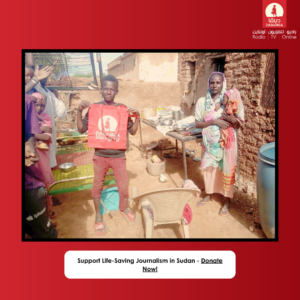Authorities attempt to disrupt social media, internet traffic in Sudan
News, pictures, and videos of the street protests in Sudan continue to reach the outside world, despite apparent attempts by the Sudanese authorities to disrupt internet traffic in the country.

News, pictures, and videos of the street protests in Sudan continue to reach the outside world, despite apparent attempts by the Sudanese authorities to disrupt internet traffic in the country.
According to reports by Reuters and AFP, Sudanese authorities are blocking access to popular social media platforms used to organise and broadcast nationwide anti-government protests, internet users say.
In a country where the state tightly controls traditional media, the internet has become a key information battleground. Of Sudan’s 40 million people, some 13 million use the internet and more than 28 million own mobile phones, local media say.
As reported by Radio Dabanga last month, in the early days of the current wave of mass street protests, a government-imposed internet blockade on social media on December 20. Journalists and activists from Khartoum told Radio Dabanga that they were unable to surf to social media platforms and here has been very slow internet access in general, they pointed out.
Subscribers to the Sudanese Zain internet provider in particular faced severe difficulties in using their instant messaging services on mobile phones such as WhatsApp. Zain, for its part, released a statement in Arabic on its Facebook page claiming that the blocking of some sites are caused by reasons that are “technical and outside of the scope of the company's competence”.
An international observatory of internet disruptions, NetBlocks, reported at the time that about the technical evidence it found indicating the internet censorship imposed by the regime is aimed at suppressing the spread of communication and photographic footage which may spark further demonstrations. Social media platforms such as Facebook effectively saw relatively less photos and videos uploaded by protesters than in previous days.
Internet blackout
Authorities have not repeated the internet blackout they imposed during deadly protests in 2013. But the head of Sudan’s National Intelligence and Security Service, Salah Abdallah, told a rare news conference on December 21: “There was a discussion in the government about blocking social media sites and in the end it was decided to block them.”
Users of the three main telecommunications operators in the country — Zain, MTN and Sudani — said access to Facebook, Twitter and WhatsApp has only been possible through use of a virtual private network (VPN).
Though VPNs can bring their own connection problems and some Sudanese are unaware of their existence, activists have used them widely to organize and document the demonstrations.
NetBlocks, a digital rights NGO, said data it collected, including from thousands of Sudanese volunteers, provided evidence of “an extensive internet censorship regime”.
(Sources: Reuters / AFP)











 and then
and then